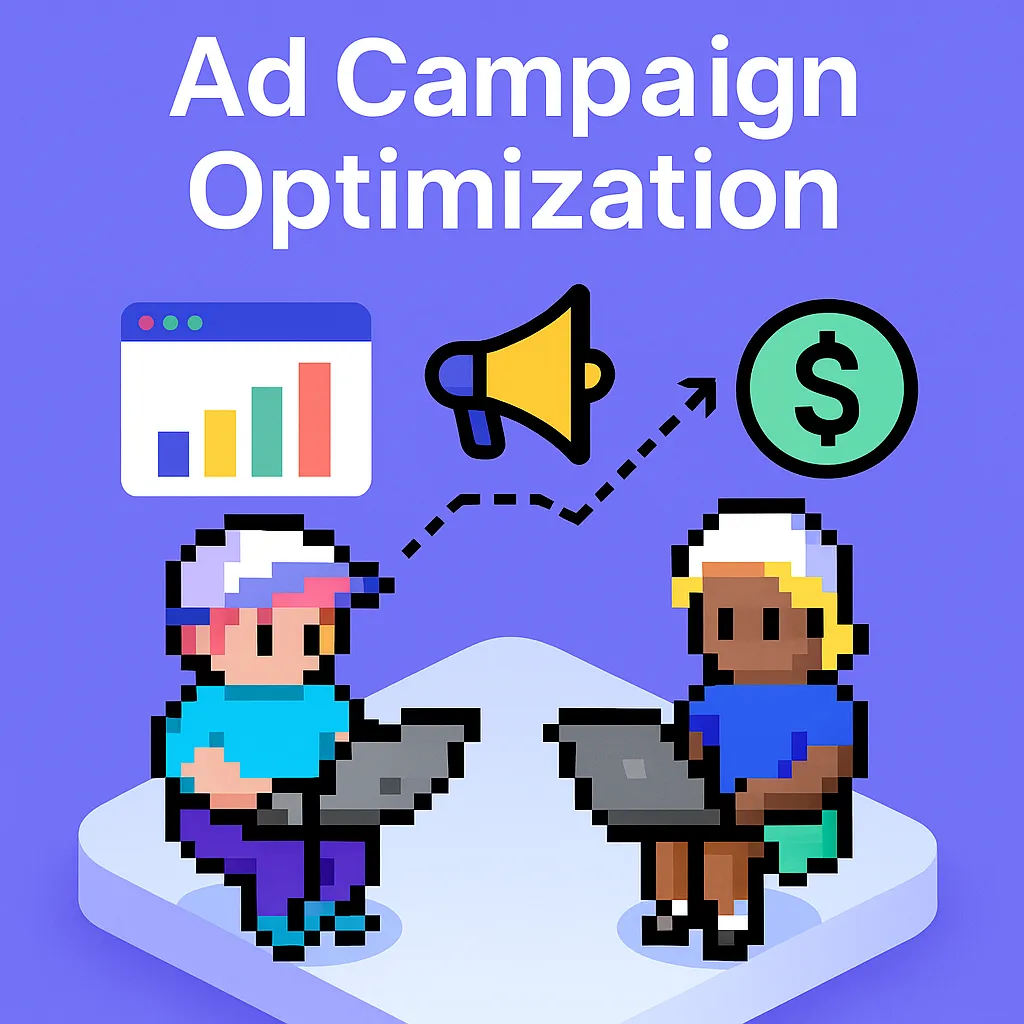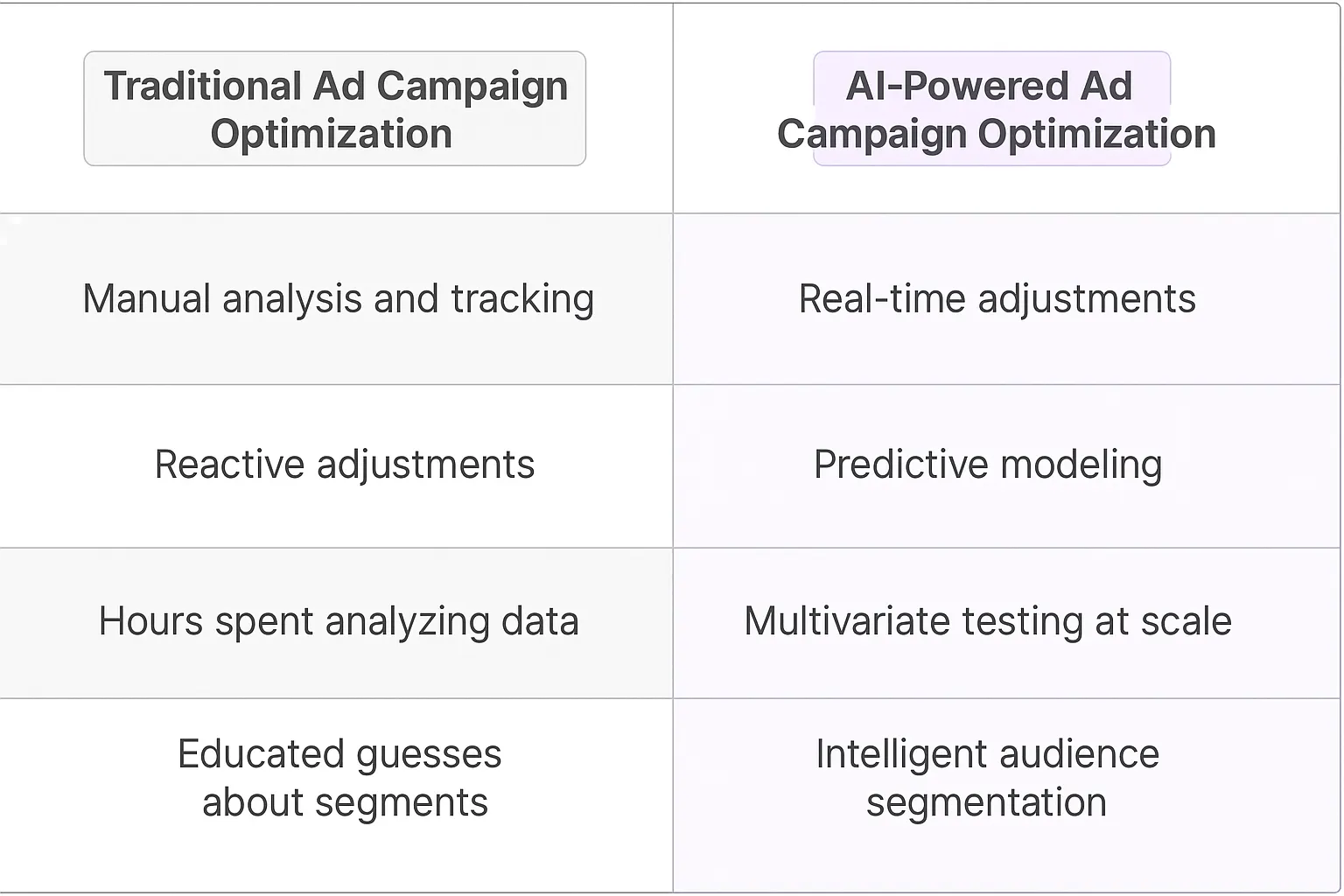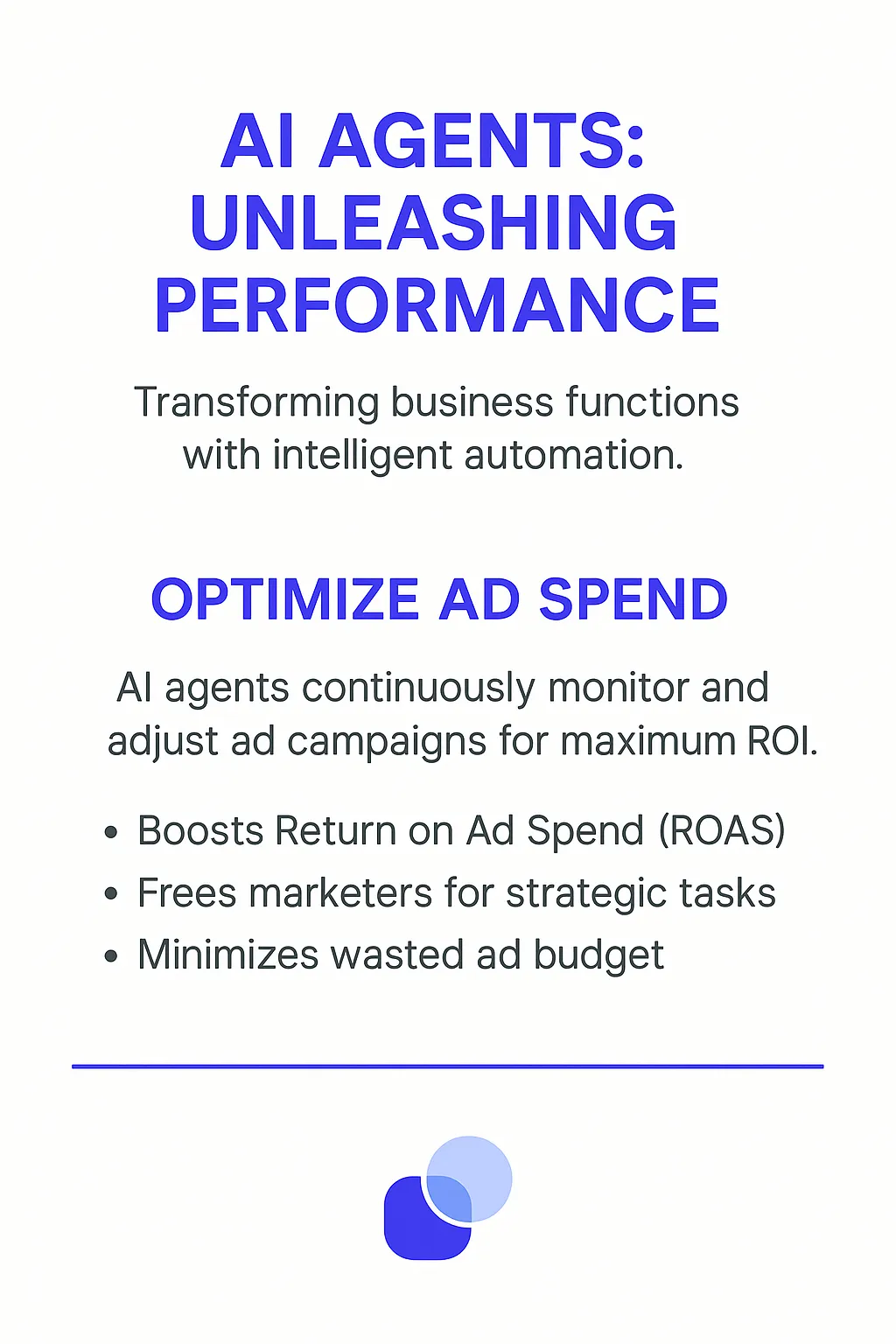Ad Campaign Optimization AI Agents
Revolutionizing Digital Advertising with AI-Powered Optimization
What is Ad Campaign Optimization?
Ad Campaign Optimization is the process of refining and improving digital advertising campaigns to maximize their effectiveness. It's about squeezing every ounce of performance out of your ad spend. In the past, this was a manual process involving spreadsheets, guesswork, and a lot of coffee. Now, AI agents are taking this to a whole new level, turning it into a data-driven, real-time operation that never sleeps.
Key Features of Ad Campaign Optimization
- Real-time Adjustments: AI agents can tweak bids, targeting, and creative elements on the fly, responding to market changes as they happen.
- Predictive Modeling: These digital teammates can forecast trends and anticipate audience responses, allowing marketers to stay ahead of the curve with Predictive Modeling.
- Multivariate Testing: Forget A/B testing. AI agents can test countless variations simultaneously, uncovering winning combinations at scale.
- Audience Segmentation: AI excels at slicing and dicing audience data, uncovering micro-segments that human marketers might miss with advanced Audience Segmentation.
- Cross-channel Optimization: These agents can manage and optimize campaigns across multiple platforms simultaneously, something impossible for human teams to do manually.

Benefits of AI Agents for Ad Campaign Optimization
What would have been used before AI Agents?
Before AI agents entered the scene, ad campaign optimization was a manual, time-consuming process. Marketers would spend hours poring over spreadsheets, analyzing data from multiple sources, and making educated guesses about audience segments and ad placements. It was like trying to solve a Rubik's cube blindfolded – you might eventually get it right, but it would take forever and you'd probably mess up a few times along the way.
Teams relied heavily on A/B testing, which, while useful, is inherently limited. You can only test so many variables at once, and by the time you've gathered enough data to make a decision, the market might have already shifted. It was a constant game of catch-up, with marketers always feeling one step behind the rapidly evolving digital landscape.
What are the benefits of AI Agents?
Enter AI agents for ad campaign optimization. These digital teammates are like having a team of data scientists, behavioral psychologists, and marketing gurus working 24/7 to fine-tune your campaigns. They're not just crunching numbers; they're uncovering patterns and insights that human marketers might miss.
One of the biggest benefits is real-time optimization. AI agents can analyze campaign performance as it happens, making micro-adjustments to bids, targeting, and creative elements on the fly. This means your campaigns are always operating at peak efficiency, adapting to market changes and consumer behavior in real-time.
AI agents also excel at predictive modeling. They can forecast trends and anticipate how different audience segments will respond to various ad formats and messages. This allows marketers to be proactive rather than reactive, staying ahead of the curve instead of constantly playing catch-up.
Perhaps most importantly, AI agents free up human marketers to focus on strategy and creativity. Instead of getting bogged down in data analysis and manual optimizations, marketers can spend their time developing innovative campaigns and exploring new channels. It's like having a co-pilot for your marketing efforts – the AI handles the technical details while you chart the course.
The result? Campaigns that not only perform better but also scale more effectively. AI agents can manage and optimize thousands of ad variations across multiple platforms simultaneously, something that would be impossible for a human team to do manually. This level of granular control and optimization leads to higher ROI and more efficient use of ad spend.
In the end, AI agents for ad campaign optimization aren't just tools – they're transformative technologies that are reshaping the entire field of digital marketing. They're enabling a level of precision and performance that was previously unimaginable, and they're just getting started. As these AI agents continue to evolve and learn, their impact on the advertising industry will only grow more profound.

Potential Use Cases of AI Agents for Ad Campaign Optimization
Processes
Ad campaign optimization is a complex dance of data analysis, creative tweaking, and budget allocation. AI agents are stepping onto this dance floor with some seriously smooth moves. They're not just following the rhythm; they're improvising in ways that human marketers could only dream of.
These digital teammates can continuously monitor campaign performance across multiple channels, platforms, and demographics. They're processing vast amounts of data in real-time, identifying patterns and trends that would take a human team weeks to uncover. This constant vigilance allows for rapid adjustments to bidding strategies, audience targeting, and creative elements.
But it's not just about reacting. These AI agents are proactive, using predictive analytics to forecast campaign performance and suggest preemptive optimizations. They're essentially time travelers, giving marketers a glimpse into the future performance of their ads before they even launch.
Tasks
Let's break down some specific tasks where AI agents are making waves in ad campaign optimization:
- Bid Management: AI agents can adjust bids in real-time based on a multitude of factors including time of day, user behavior, and competitor activity. They're not just following rules; they're learning and adapting their bidding strategies on the fly.
- Creative Testing: Forget A/B testing. AI agents can perform multivariate testing at scale, analyzing the performance of countless creative variations simultaneously. They're identifying winning combinations of copy, images, and CTAs faster than you can say "click-through rate".
- Audience Segmentation: AI agents are slicing and dicing audience data in ways that make traditional segmentation look like child's play. They're uncovering micro-segments and niche audiences that human marketers might never have considered.
- Budget Allocation: These digital teammates are masters of resource allocation, shifting budgets between campaigns, ad groups, and keywords to maximize ROI. They're not just following predefined rules; they're making nuanced decisions based on complex interplays of data.
- Performance Forecasting: AI agents are peering into the crystal ball of ad performance, predicting future trends and potential roadblocks. They're giving marketers the power to course-correct before issues even arise.
The beauty of these AI agents is that they're not replacing human marketers; they're augmenting them. They're handling the data-heavy grunt work, freeing up human creativity for big-picture strategy and innovative campaign concepts. It's a symbiosis that's pushing the boundaries of what's possible in digital advertising.
As these AI agents continue to evolve, we're going to see ad campaigns that are more personalized, more responsive, and more effective than ever before. The future of ad optimization isn't just automated - it's intelligent, adaptive, and exciting as hell.

Industry Use Cases for Ad Campaign Optimization AI Agents
The ad tech landscape is evolving at breakneck speed, and AI agents are at the forefront of this transformation. These digital teammates are reshaping how businesses approach ad campaign optimization across various sectors. Let's dive into some concrete examples that illustrate how AI is elevating advertising strategies and delivering tangible results.
From e-commerce giants fine-tuning their product recommendations to local businesses maximizing their ad spend, AI agents are proving to be game-changers. They're not just tools; they're becoming integral parts of marketing teams, offering insights and optimizations that were once the domain of seasoned professionals.
What's particularly exciting is how these AI agents are democratizing advanced advertising techniques. Small startups can now compete with industry titans, leveraging AI to craft campaigns that resonate with their target audience and drive conversions. It's a new playing field where creativity meets data-driven decision making, and the results are nothing short of impressive.
E-commerce: Precision-Targeting with AI-Driven Ad Campaigns
The e-commerce landscape is a battlefield of attention, and Ad Campaign Optimization AI Agents are the secret weapons smart retailers are deploying. These digital teammates aren't just tweaking bids; they're orchestrating symphonies of consumer engagement.
Take a high-growth D2C fashion brand. Their AI agent ingests a cocktail of data: past purchase history, browsing patterns, social media engagement, and even weather forecasts. It's not just about who clicked what, but understanding the 'why' behind each interaction.
This AI doesn't just optimize - it predicts and adapts in real-time. It might notice that millennial women in urban areas are more likely to purchase sundresses on sunny Friday afternoons. Boom - it adjusts bids, ad copy, and creative on the fly to capitalize on this micro-moment.
But here's where it gets interesting: the AI starts to identify complex, non-obvious correlations. Maybe it discovers that users who engage with sustainability content are 30% more likely to convert on eco-friendly product lines. Suddenly, your ad strategy isn't just reactive; it's predictive and proactive.
The result? A hyper-personalized ad experience that feels less like marketing and more like mind-reading. CTRs skyrocket, CAC plummets, and ROAS goes through the roof. But beyond the metrics, you're building a brand that resonates on a deeper level with your audience through enhanced customer engagement.
This isn't just optimization; it's evolution. Your ad campaigns become living, breathing entities that learn and adapt faster than any human team could. In the e-commerce arms race, AI-driven ad optimization isn't just an edge - it's the whole sword.
Real Estate: AI-Powered Ad Campaigns Redefining Property Marketing
The real estate market is notoriously cyclical and hyper-local. It's a perfect storm for AI-driven ad optimization. Let's dive into how a forward-thinking real estate firm is leveraging AI to turn property listings into profit centers.
This isn't your grandpa's "For Sale" sign. The AI agent here is a digital real estate savant, crunching numbers on everything from local market trends and seasonal buying patterns to individual browsing behaviors and life events. It's like having a team of expert agents, data scientists, and psychologists working 24/7 to perfect your ad strategy.
Here's where it gets spicy: the AI doesn't just target potential buyers; it predicts them. By analyzing vast datasets of demographic information, social media activity, and even public records, it identifies users who are likely to be in the market for a new home before they even start searching.
But the real magic happens in the micro-targeting. The AI might discover that young families in suburban areas are more likely to engage with video tours on weekday evenings, while empty nesters prefer detailed floor plans viewed on Sunday mornings. It then tailors the ad format, content, and delivery time to these precise preferences.
The AI also plays the long game. It understands that real estate decisions aren't impulsive, so it orchestrates multi-touch campaigns that nurture leads over months. It might start with awareness-level ads showcasing neighborhood amenities, then gradually introduce specific properties as the user shows more intent through strategic lead generation.
The results are staggering. We're seeing conversion rates triple, cost-per-lead drop by 60%, and time-on-market for listings plummet. But beyond the numbers, this AI is fundamentally changing how people find their dream homes.
This isn't just about selling houses faster; it's about creating perfect matches between properties and people. In a world where finding a home is increasingly digital, AI-powered ad optimization is becoming the new location, location, location.
Considerations
Technical Challenges
Implementing an Ad Campaign Optimization AI Agent isn't a walk in the park. It's more like trying to solve a Rubik's Cube blindfolded while riding a unicycle. The first hurdle? Data integration. You're dealing with a mishmash of data sources - social media platforms, ad networks, CRMs, and analytics tools. Each speaks its own language, and your AI needs to be fluent in all of them.
Then there's the machine learning model itself. It's not just about throwing data at an algorithm and hoping for the best. You need to carefully select and engineer features that actually matter for ad performance. Is it the ad copy? The image? The time of day? The phase of the moon? (Kidding on that last one, but you'd be surprised what can impact ad performance.)
And let's not forget about real-time processing. Ad campaigns move at the speed of light in the digital world. Your AI needs to keep up, making split-second decisions on bid adjustments, audience targeting, and creative optimization. It's like trying to play chess while the board is constantly shifting.
Operational Challenges
On the operational side, things get even trickier. First up: the human factor. Your marketing team might view this AI agent as the Terminator, coming to steal their jobs. You need to frame it as Iron Man's suit instead - a tool that enhances their capabilities rather than replaces them.
Then there's the black box problem. AI models, especially deep learning ones, can be notoriously opaque. When your CEO asks why the AI decided to double the budget on a seemingly underperforming campaign, "because the AI said so" isn't going to cut it. You need to build in explainability from the ground up.
Compliance and privacy are another minefield. With regulations like GDPR and CCPA, your AI needs to be a legal eagle as well as a marketing guru. It needs to know what data it can use, how it can use it, and when it needs to forget it.
Finally, there's the ever-present challenge of measuring ROI. Sure, your AI might be optimizing click-through rates and reducing cost-per-acquisition, but is it actually driving business value? Tying these metrics to real business outcomes is crucial, but it's about as easy as nailing jelly to a wall.
Implementing an Ad Campaign Optimization AI Agent is a complex endeavor, but get it right, and you'll have a digital teammate that never sleeps, never takes a coffee break, and is always pushing to squeeze more performance out of your ad spend. Just don't expect it to laugh at your jokes in the team meetings.
The Future of Digital Marketing: AI-Powered Precision and Performance
Ad Campaign Optimization AI Agents are more than just a trend - they're the future of digital marketing. They're enabling a level of precision, scale, and performance that was previously unimaginable. But here's the kicker: we're just scratching the surface. As these AI agents continue to evolve, they'll unlock new possibilities in personalization, predictive marketing, and cross-channel optimization.
The marketers who embrace these digital teammates now will be the ones leading the pack in the years to come. It's not about replacing human creativity - it's about augmenting it with superhuman data processing and decision-making capabilities. The result? Campaigns that don't just perform better, but that resonate more deeply with audiences and drive real business outcomes.
The ad tech arms race is on, and AI agents are the secret weapons. The question isn't whether you'll adopt this technology, but how quickly you'll do it and how effectively you'll integrate it into your marketing strategy. The future of advertising is here, and it's powered by AI.













